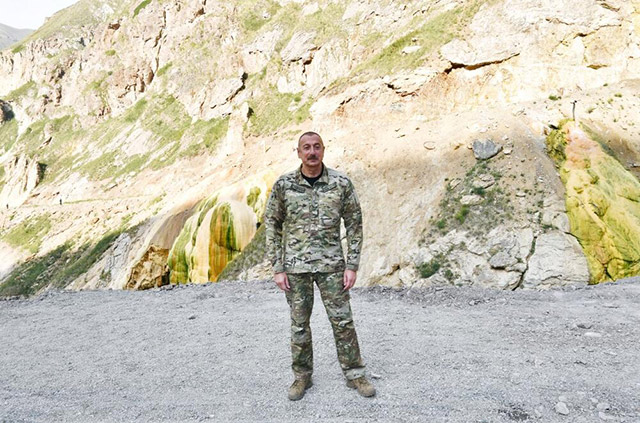The National Interest has published an article about the 2020 war launched by Azerbaijan against Artsakh (Nagorno Karabakh), the Turkish and Azerbaijani aggression, atrocities, the necessity of imposing sanctions on Azerbaijan, the urgency of the return of all Armenian prisoners of war from Azerbaijan, as well as about the silence of the international community.
“Azerbaijan and Turkey launched their assault on Nagorno Karabakh to continue the Ottoman project of more than a century ago. Silence encourages them and others”, Michael Rubin, a resident scholar at the American Enterprise Institute (AEI), starts his article.
“One year ago on September 27, the Azerbaijani army, backed by Turkish Special Forces and Syrian jihadis acting as Turkish mercenaries, launched a surprise attack on Nagorno Karabakh”, he says. “When in 1991, Azerbaijan re-asserted its independence upon the collapse of the Soviet Union, its parliament did so based on the borders of the first independent Republic of Azerbaijan and not upon the territory of the subsequent Soviet-created Azerbaijan Soviet Socialist Republic. The population of the autonomous oblast voted to secede from Azerbaijani control, a move that was constitutionally valid”.
The article notes that “Baku had committed as part of the Minsk Group process to resolve the territorial dispute diplomatically”. “While Azerbaijani diplomats might say the progress was going nowhere, that was a lie”, Michael Rubin says.
Read also
“Biden was right to recognize officially the Armenian Genocide. However, the following day, Blinken quietly waived Section 907 again, effectively rewarding Azerbaijan for its aggression. By both the letter and the spirit of the Freedom Support Act, Blinken’s move violated U.S. law”, he says.
The author of the article has also recalled the continuous aggression by Azerbaijan. “On March 25, 2021, Azerbaijani soldiers threw stones at Armenian civilian cars on the Sarushen-Karmir Shuka road in Artsakh’s Askeran region. Three days later, Azerbaijani troops ambushed an Armenian vehicle transporting the bodies of Armenian soldiers killed in the forty-four-day war. On April 20, Azerbaijani forces fired at an Armenian home on Vagharshyan Street in the Stepanakert, the capital of Artsakh”, Michael Rubin says. “Despite Azerbaijan’s diplomatic promises to respect religious freedom, on April 26, three Azerbaijani soldiers beat and dragged an Armenian pastor in Syunik’s Aravus village. Two days later, between eight and ten Azerbaijanis in civilian dress infiltrated the buffer zone between the two sides, before being chased off by Armenian forces. In June, such aggression accelerated yet again. Azerbaijani soldiers, perhaps hungry as Azerbaijani officials embezzled military supplies, fired on shepherds in Armenia and stole their cattle.
“As the Biden administration remained silent, Azerbaijan increased the severity of attacks”, the author of the article notes.
Perhaps the biggest Azerbaijani affront, however, is the continued holding and torture of Armenian prisoners of war (POW). While the State Department might make occasional calls for their return, Azerbaijani authorities dismiss these as readily as the Taliban does Blinken’s calls for diversity in the Taliban cabinet. After all, when Blinken waives sanctions on Azerbaijan to allow American funding to flow to Baku, why should Aliyev take American statements seriously?
Azerbaijan and Turkey launched their assault on Nagorno Karabakh to continue the Ottoman project of more than a century ago. Silence encourages them and others. The precedent of ethnic cleansing that they undertake—and the lack of any serious response to it—could destabilize areas far beyond the South Caucasus. It is time to sanction Azerbaijan until Aliyev returns the last Armenian POW, pays compensation for his aggression, and holds accountable every Azerbaijani soldier on video torturing Armenians or destroying cultural heritage”, Michael Rubin said in his article.



























































